-
-
2025 | 2026 - Education and Examination Guides - All Programmes
-
-
This glossary contains an overview of some of the terminologies, definitions and abbreviations used at Wittenborg University of Applied Sciences.
Wittenborg Online News!
A message to our Iranian students, alumni and colleagues
A message to our Iranian students, alumni and colleagues
We are very aware that the recent and ongoing attacks involving the USA and Israeli forces in Iran are likely causing significant concern, uncertainty, and emotional strain for many of you. Although you are here in the Netherlands, we understand that your thoughts will be with your families, friends, and loved ones at home.
At this stage, there is still very little clarity about how the situation may develop, which can make this period particularly distressing. Please know that as a university community, we are thinking of you and of those close to you who may be directly affected.
We also recognise that the current escalation affects people across the wider region. Members of our community may have family and friends in neighbouring countries who are experiencing uncertainty and fear. Our thoughts are with everyone impacted by the violence, regardless of nationality or background.
We sincerely hope that all families remain safe and that the situation moves towards stability and peace as soon as possible. If you are finding this time difficult, we encourage you to reach out to colleagues, line managers, student support services, or HR — we are here to support one another.
With our warmest thoughts and solidarity during this challenging time.
Peter Birdsall
President
216 words
Wittenborg Kicks Off Erasmus+ AIDEA Project in Rome
Wittenborg Kicks Off Erasmus+ AIDEA Project in Rome
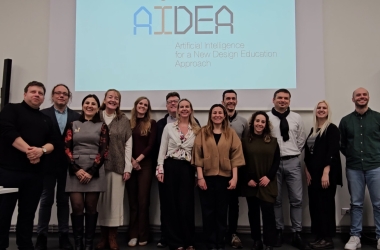
https://www.wittenborg.eu/wittenborg-kicks-erasmus-aidea-project-rome.htm
Wittenborg Joins Partners in Launching AIDEA Project in Rome
Wittenborg has joined partners from across Europe for the Kick-off Meeting (KOM) of the Erasmus+ project AIDEA (Artificial Intelligence for a New Design Education Approach), held in Rome on 3 to 4 February.
The meeting brought together 14 representatives from all eight project partners, including institutions from Italy, Slovenia, the Netherlands, Austria, the Republic of North Macedonia and Ireland. Coordinated by Accademia Italiana Moda e Design with support from CIAPE, AIDEA aims to transform European design education by combining the intelligence of the hand, artificial intelligence and social intelligence.
“The Kick-off Meeting was a highly productive start for the project,” said Aydan Holtrigter, Head of Research Partnerships and International Mobility at Wittenborg. “It allowed us to dive into detailed discussions on project organisation, next steps, deadlines and coordination. We also agreed on the communication strategy and set clear KPIs for the months ahead.”
Wittenborg has previously collaborated with some partners, including CIAPE and STEP, through the INFURI project (2020–2023). The rest of the consortium were new to Wittenborg.
“Meeting partners in person was a valuable experience,” Aydan added. “It helps establish the right attitude and work ethic from the very beginning. The KOM allowed us to align approaches, define action plans, and agree on a strategy that everyone can follow moving forward.”
Also attending from Wittenborg was lecturer Robert Muster, who contributed insights on curriculum integration and the practical implementation of AI-driven design activities for students.
Over the two-day meeting, the consortium finalised timelines, clarified administrative and coordination processes, and agreed on the next steps for participatory research, creation of the Manifesto for Collective AI Design, the Handbook of teaching tools, train-the-trainer sessions, piloting with students and companies, and a pre-incubation programme that will bring AI-driven prototypes to life.
Wittenborg leads Work Package 5: Communication, Dissemination and Upscaling, coordinating the pre-incubation programme and developing the project’s communication strategy. The university also contributes to research and content creation for the Manifesto and Handbook, ensuring ethical and entrepreneurial perspectives on AI are fully integrated into the curriculum.
“KOM was not just about planning, it was about building relationships and trust,” Aydan reflected. “Starting the project on a strong, aligned footing is crucial for delivering impactful results for students and for European design education as a whole.”
Running from December 2025 to August 2028, AIDEA will provide students and staff with opportunities to explore the transformative potential of AI in design, combining research, creativity and practical application to meet real-world market needs.
WUP 27/02/2026
by Erene Roux
©WUAS Press
Tags
#SDG17: Partnerships to achieve the Goal
#Internationalisation
#Diversity
#research
#Erasmus+
#ResearchCentre
447 words
International Academic Advisory Panel Shapes Wittenborg’s Direction for 2026
International Academic Advisory Panel Shapes Wittenborg’s Direction for 2026
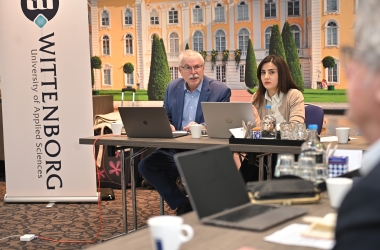
IAAP Meeting Reviews Progress and Sets Strategic Priorities for 2026
On 7 February, Wittenborg held its annual International Academic Advisory Panel (IAAP) meeting in a hybrid format, with thirteen members joining from Apeldoorn and online. The session included IAAP members Ben Q. Honyenuga, Nuran Acur, Erik Devos, Leo Paul Dana, Peter van Zürcher, Marina Dabic, Petra de Weerd-Nederhof, Ed Vosselman, Ed Peelen, and Jasmina Selimovic, along with Wittenborg leadership: Ron Tuninga, Peter Birdsall, Aydan Holtrigter, and Kriszta Kaspers.
One of the main topics was the AACSB (Association to Advance Collegiate Schools of Business) peer review visit in 2025. The panel saw this as an important milestone for Wittenborg and discussed high-level priorities for the institute. These included making sure strategy is clearly linked to action, improving the monitoring of student progress, and growing research capacity and impact.
Research was another key focus. From 2021 to 2025, Wittenborg coordinated or participated in ten funded projects, primarily within Erasmus+ and capacity-building frameworks. Holtrigter, the Head of Research Partnerships at Wittenborg, presented an overview of these activities, and IAAP members offered guidance on strengthening applied, practice-oriented business research.
They suggested linking funded projects more closely with publications, finding ways to share research in practical outlets, and working more closely with industry and European partners. Members also highlighted the importance of student and staff mobility, international research networks, and academic events such as workshops and seminars in supporting research impact and visibility.
Kaspers, Head of Education Development and Quality Management, said:
“The IAAP’s advice is really valuable. It helps us focus on what matters most. Connecting strategy to action, supporting applied research, and building stronger international links are key priorities for Wittenborg.”
The panel also reviewed strengths identified during the AACSB peer review. These included a diverse and international student body and staff, strong engagement from students, and clear links with the local and regional community. Areas for further improvement included making strategy more actionable, tracking student progress in more detail, and increasing research output.
Preparations for upcoming NVAO and FIBAA programme accreditations were also discussed. These remain important for maintaining degree-awarding authority and programme continuity.
The meeting formally acknowledged the departure of Weerd-Nederhof from the IAAP after five years, recognising her contributions and dedication.
A follow-up online IAAP session focusing on education strategy and AI is planned for later this year.
WUP 25/02/2026
by Erene Roux
©WUAS Press
Tags
#SDG4: Quality Education
#Internationalisation
#Diversity
#Ethics
#research
#accreditedbusinessschool
#AACSB
415 words
Wittenborg Brings Milestone Week to a Close with Annual Staff Dinner
Wittenborg Brings Milestone Week to a Close with Annual Staff Dinner
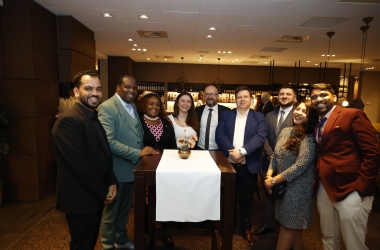
https://www.wittenborg.eu/wittenborg-brings-milestone-week-close-annual-staff-dinner.htm
Over 100 Colleagues and Partners Gather in Apeldoorn for an Evening of Celebration
On 6 February, Wittenborg’s annual staff dinner returned to the Bilderberg Hotel De Keizerskroon in Apeldoorn — marking the third time the event has been held at the venue. What is fast becoming a tradition provided the perfect setting to conclude a significant week for the institution.
The dinner followed Introduction Week, Wittenborg’s Winter Graduation ceremony and the Advisory Board meeting earlier that day, with the International Academic Advisory Panel (IAAP) convening in Apeldoorn the following morning.
Together, these milestones reflected the full scope of Wittenborg’s mission: celebrating student achievement, evaluating strategic direction, and strengthening academic quality.
With more than 100 attendees, including staff, guest lecturers, Advisory Board members and IAAP representatives, the evening offered a valuable opportunity to connect beyond formal meetings and ceremonies. Colleagues from across departments and study locations gathered in a relaxed atmosphere to reflect on progress, exchange ideas and enjoy each other’s company.
A professional photography session once again added a special touch to the evening, allowing attendees to capture portraits and team photos.
Reflecting on the evening, Sopha Faraji, External Relations & Events Manager, shared:
“It was such a great opportunity to connect and really enjoy being together as colleagues. The energy in the room was fantastic, and seeing everyone engage so openly made all the effort worthwhile.”
Looking Ahead with Confidence
During the dinner, President Peter Birdsall addressed the room, reflecting on both the wider landscape of international education and Wittenborg’s long-term development.
He observed that “there does seem to be a growing recognition that internationalisation — and English-taught education in particular — is not something to be rolled back, but something to be managed sensibly and valued.” For Wittenborg, this remains central. “Students choose not only an institution, but they choose a society, a country,” he noted, underlining the importance of the Netherlands’ international reputation and openness.
Recognising the collective effort behind the institution’s progress, he told attendees: “Everybody in this room contributes daily to international education.”
Reflecting on the recent panel visit from AACSB (Association to Advance Collegiate Schools of Business), he described it as “an exceptional AACSB panel visit.” He reminded colleagues that AACSB accredits only around 6% of business schools worldwide, and that the professionalism, openness and academic maturity demonstrated during the visit were exactly what one would expect at this stage of Wittenborg’s journey.
“Wittenborg presented itself with confidence, credibility and integrity,” he said, adding that this “matters enormously, both for now and in the long term.”
Looking beyond accreditation, he highlighted long-term institutional thinking, particularly Wittenborg’s sustained commitment to student accommodation. Referring to the Randerode project in partnership with Zorggroep Apeldoorn and real estate intermediary De Kabath, he emphasised that the initiative reflects the institution’s broader philosophy.
“We’re not only educating students,” he said. “We’re building the conditions in which they can live, belong and succeed.”
He stressed that such developments are not short-term gestures but signs of careful, responsible planning: “These are not short-term gestures, but signals of an institution that is planning carefully, investing responsibly and thinking well beyond the next academic year.”
Closing on a strong and optimistic note, he added: “I can say without qualification that I am profoundly confident about Wittenborg’s future, for our students and our academic mission.”
WUP 23/02/2026
by Erene Roux
©WUAS Press Tags
#SDG4: Quality Education
#Internationalisation
#Diversity
#Ethics
#apeldoorn
574 words
Wittenborg Students Move into Randerode as Institution Expands Housing
Wittenborg Students Move into Randerode as Institution Expands Housing
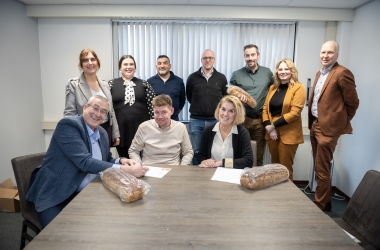
https://www.wittenborg.eu/wittenborg-students-move-randerode-institution-expands-housing.htm
Wittenborg and Zorggroep Apeldoorn Formalise Housing Partnership
Wittenborg has signed an agreement to house students on a vacant floor at Randerode, a healthcare facility operated by Zorggroep Apeldoorn. The initiative, in collaboration with real estate intermediary De Kabath, aims to create a community, where students and older residents live together under one roof.
The full press release from Zorggroep Apeldoorn can be read here.
The first four students already received their keys on 23 January, and eventually up to 30 international Wittenborg students are expected to live in Randerode. These new residents bring energy and activity to the site, and are seen as a great example of how young and old can live together in a meaningful community.
Nicoleta Salaru, Front Office and Housing Coordinator at Wittenborg, said:
“The floor offers bright and pleasant single and double rooms with shared kitchens and bathrooms. The location is peaceful and close to the forest, with a bus stop right outside and bicycle parking nearby. Students will have personal access passes with their photos for safety. Contracts can last up to one year, and all furniture is brand new, including beds, mattresses, desks, chairs and lounge furniture. Each room also has a fridge and a sink, and there is a fully equipped kitchen for shared use.”
Peter Birdsall, President of Wittenborg, added:
“We always say: if you cannot house them, do not recruit them. This agreement shows our commitment to providing students with comfortable, safe accommodation while giving them the chance to connect with the community and interact with residents of all ages.”
The Randerode floor is part of Wittenborg’s broader approach to student housing in Apeldoorn, offering secure and comfortable rooms close to its study locations. Other options include shared apartments, dormitories and studios, all with furniture and high-speed internet.
Students who have completed their Study Agreement, paid the package fee and received their visa can request a room. You can read more about it here.
Looking Ahead: A New Campus in Apeldoorn
Wittenborg is also taking a major step toward a new campus in Apeldoorn’s Learning District. A letter of intent has been signed with developers BPD | Bouwfonds Gebiedsontwikkeling and Dura Vermeer, marking the start of a collaboration with the municipality and other education partners.
The planned campus will include modern educational facilities, student accommodation and shared spaces designed for learning, socialising and community interaction. Wittenborg aims to expand its Apeldoorn student population from 1,500 to at least 2,500, providing more beds for international students and creating a lively, international hub in the city.
CEO Maggie Feng described the partnership as “years of patience, networking, listening and determination”, and said:
“We want this to be a place where everyone would like to be. A place that is young, fun, international and built on shared values. It’s not about age but mindset.”
WUP 20/02/2026
by Erene Roux
©WUAS Press
Tags
#apeldoorn
#SDG17: Partnerships to achieve the Goal
#Internationalisation
#internationalstudent
498 words
Students from over 20 countries graduate in Wittenborg Winter Graduation 2026
Students from over 20 countries graduate in Wittenborg Winter Graduation 2026
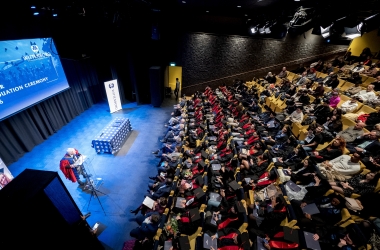
https://www.wittenborg.eu/students-over-20-countries-graduate-wittenborg-winter-graduation-2026.htm
Celebrating achievement across bachelor’s, master’s and specialised programmes
On 6 February, Wittenborg hosted one of its most anticipated events of the year: its Winter Graduation 2026, celebrating the achievements of graduates from more than 20 countries.
Students from bachelor’s, master’s, and specialised programmes completed courses in areas such as Business Administration, Digital Marketing & Communication, Entrepreneurship, Logistics & Trade, International Management, Data Analytics, Cyber Security, Hospitality, Finance, Health and Social Care, and Education.
The ceremony, held at Theater Orpheus in Apeldoorn, recognised not only academic excellence but also the resilience, adaptability, and global perspective these students have developed during their studies.
Vajihe Shojaei, Assistant Professor of Applied Sciences, addressed the bachelor’s graduates with words that resonated throughout the hall:
"Your future won’t always be easy but you are not starting from zero. You’re starting from experience. Failure often means you were brave enough to try. You already know how to survive the messy middle. Now go build something meaningful, step by step, with courage and kindness toward yourself and others."
For the Master of Business Administration graduates, Dadi Chen, Deputy Head of the School of Business, highlighted the skills and mindset that will help them navigate the world beyond Wittenborg:
"You didn’t just learn about being a ‘global citizen’ in a textbook; you lived it. You are not just graduates; you are ‘AI-powered explorers.’ Your authenticity, cross-cultural empathy, and human-centred leadership are your greatest competitive advantages in this ever-changing world."
Students also reflected on the journey themselves. Mehak Panwar, graduating in Marketing Communication & Information, spoke candidly about the challenges and personal growth experienced throughout the programme:
"The best thing we can do for ourselves is not to compare, not our progress, not our struggles, not our goals. Cherish your own journey and truly enjoy your life."
She added that despite late nights, group work, and thesis challenges, the determination and consistency of the graduates brought them to this milestone, a sentiment echoed by her classmates.
Harshal Sonawane, an MBA in Data Analytics graduate, shared a similar sense of fulfilment. He chose the programme to combine business strategy with data-driven decision-making in today’s digital world. He described graduating as both rewarding and deeply satisfying, noting that the journey had been challenging but transformative for his professional and personal growth.
For Sonawane, the most memorable moments were working on his thesis and collaborating with people from different cultural backgrounds, experiences that strengthened both his analytical skills and his global outlook. Looking ahead, he aims to build a career in data analytics and artificial intelligence, helping organisations make smarter, data-driven decisions.
Other speakers of the day included Peter Birdsall, who welcomed the guests; Prof. Dr Ed Vosselman, who gave the opening address; Tolulope Oluwatosin-Lawal, the Master’s representative; Robert Muster, lecturer for the MSc cohort; and Colin MacKenzie, Associate Professor of Applied Sciences, who delivered the closing speech.
In his address, MacKenzie drew on stories from the Scottish Enlightenment, citing philosophers, economists, and historical figures such as David Hume, Adam Smith, Mary Slessor, and Robert Burns to illustrate resilience, curiosity, and the power of ethical action. Highlighting Burns’ famous reflection that “the best laid schemes of mice and men gang aft agley,” he reminded graduates that plans may not always unfold as expected, but persistence and creative problem-solving can overcome obstacles.
He closed with a personal motto for life: the three P’s: persuasion, persistence, and passion. He encouraged graduates to apply these principles as they navigate their careers, pursue their goals, and make a positive impact in the world. “Today is your day,” he said. “Take each day one step at a time, keep in touch with Wittenborg, and shine bright.”
WUP 18/02/2026
by Erene Roux
©WUAS Press
Tags
#SDG4: Quality Education
#Internationalisation
#internationalstudent
#Diversity
#Ethics
#studyinholland
#highered
637 words
Wittenborg Strengthens Partnerships During China Visit
Wittenborg Strengthens Partnerships During China Visit
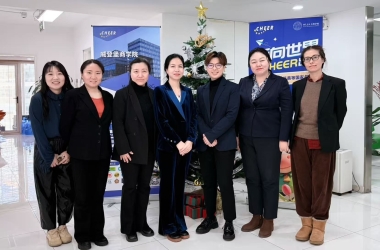
https://www.wittenborg.eu/wittenborg-strengthens-partnerships-during-china-visit.htm
Eunice Cheung Meets with Agents to Strengthen Partnerships in China
From 22 to 29 January, Wittenborg completed a successful visit to China, reinforcing its commitment to building strong international connections and supporting students worldwide.
The trip was led by Eunice Cheung, Regional Admissions Manager, who is originally from China. She travelled alone to Beijing, Shanghai and Guangzhou to meet education agents, strengthen existing partnerships and explore new opportunities to collaborate. Her local knowledge and insight made the conversations even more meaningful.
During the visit, Cheung shared what makes Wittenborg unique — its international, career-focused programmes, hands-on approach to learning and vibrant, multicultural campus community. She also highlighted the opportunities available for students looking to study in the Netherlands and gain practical experience to launch their global careers.
Reflecting on the trip, Cheung said, “It was wonderful to meet our partners in person and hear first-hand about student ambitions and challenges. These discussions really help me show what Wittenborg has to offer and how we support students every step of the way.”
For future students, the visit offered a clear picture of studying at Wittenborg and life in the Netherlands. For current students and staff, it showed how much the school values its global connections and continues to build them year after year.
Every year, Wittenborg undertakes various trips to different countries. This visit is part of the institution’s ongoing international strategy, which also includes taking part in education fairs both abroad and in the Netherlands. To see where Wittenborg will be next, check out the school’s events website.
WUP 16/02/2025
by Erene Roux
©WUAS Press
Tags
#SDG17: Partnerships to achieve the Goal
#Internationalisation
#Diversity
#studyinholland
281 words
Wittenborg Welcomes More Than 100 New Students for February 2026 Intake
Wittenborg Welcomes More Than 100 New Students for February 2026 Intake
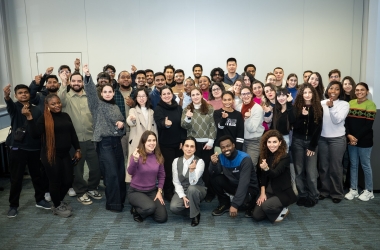
https://www.wittenborg.eu/wittenborg-welcomes-more-100-new-students-february-2026-intake.htm
Students Join Bachelor, Pre-Master, Master and other Programmes in Apeldoorn, Amsterdam and Munich
Wittenborg has welcomed over 100 new students for its February 2026 block intake, joining the institution across its Apeldoorn, Amsterdam, Munich and OnCampus study locations.
The February intake reflects Wittenborg’s strong international profile, with students arriving from over 20 countries across Asia, Africa, Europe and more. Among the largest student groups are those from India, China, Nigeria, and Sri Lanka, alongside students from Türkiye, Egypt, Morocco, Brazil, Pakistan and several European countries.
Strong Demand for Business, Technology and Entrepreneurship Programmes
The majority of new students have enrolled in Bachelor of Business Administration (BBA) programmes, including specialisations in Artificial Intelligence & Cyber Security, Hospitality Management, Economics & Management, Information Management and Event Management. A significant number have also joined the Entrepreneurial Business Administration (EBA) programmes, with pathways in Entrepreneurship & Innovation, Digital Marketing, FinTech and Small Business.
At the postgraduate level, Wittenborg has seen strong enrolment in its Pre-Master leading to Master of Business Management, Master of Business Management (MSc), and Master of Business Administration (MBA) programmes. These students are specialising in areas such as Human Resource Management, Applied Artificial Intelligence, Digital Marketing & Communication, Logistics & Trade, Data Analytics, Cyber Security, Health & Social Care and International Management.
A Warm Welcome in Apeldoorn
Welcoming students in Apeldoorn, President Peter Birdsall encouraged the new cohort to embrace the challenges and opportunities of studying abroad, drawing on his own experience as an international student.
“It’s always a fantastic opportunity to go abroad — to change a life. I’ve done it myself,” he said. “Almost all of your staff and faculty will have gone through the same experience.”
Birdsall emphasised the importance of integration, student engagement, and personal responsibility. He encouraged students to meet people outside their own national groups, join societies, volunteer and make use of the international and expat communities in Apeldoorn.
“We’re here to help you succeed. We will do everything we can to make your degrees as valuable as possible, but at the end of the day, it is your responsibility to work hard and make the most of this opportunity.”
New Student Voices: Why They Chose Wittenborg
Several students from the February intake shared their motivations for choosing Wittenborg and their early experiences in the Netherlands.
Kardelen Aydin from Türkiye, enrolled in the Pre-Master leading to the MBM in Human Resource Management in Apeldoorn, described her first weeks adjusting to life in the Netherlands.
With a background in psychology, Aydin hopes to combine her previous studies with HR to strengthen her career prospects.
“I want to specialise in human resources and combine it with psychology so I can be stronger in the HR field and find a job after graduation.”
Aysan Seyedi from Iran, also studying the Pre-Master leading to the MBM in Human Resource Management, arrived in January.
“Wittenborg is a very popular international institution, and it was recommended to me by a friend,” she explained.
Looking ahead, Seyedi is focused on personal and professional development.
“I want to improve my communication skills, make international friends, and become a strong human resource professional.”
Himanshu Patel from India is enrolled in the Pre-Master leading to the MBM in Entrepreneurship & Innovation. He chose Wittenborg for its diverse international environment and practical business focus. “The cultural dimension at Wittenborg gives me a good base to connect and grow with people from different backgrounds,” he said. Having arrived before the Introduction Week, Patel has already begun exploring Apeldoorn.
“It’s a beautiful city. I’ve been exploring the streets, and it’s been an amazing experience.” Passionate about business and the food industry, he hopes to start his own enterprise in the future and develop his leadership skills during his studies.
WUP 11/02/2026
by Erene Roux
©WUAS Press
Tags
#SDG4: Quality Education
#Internationalisation
#internationalstudent
#Diversity
#Ethics
#apeldoorn
648 words
Guest Lecture by Jacinta Parsons Explores Podcasts, Media, and Audience Engagement
Guest Lecture by Jacinta Parsons Explores Podcasts, Media, and Audience Engagement

Jacinta Parsons Shares Insights to Authentic Podcasting
How do you connect with an audience so deeply that they feel part of your story? On 8 January, students at Wittenborg explored this question with Jacinta Parsons, author and broadcaster on ABC Radio Melbourne, who joined the lecture online from Australia. Parsons shared her insights into podcasts and the art of creating genuine connections with listeners, blending professional experience, practical advice and personal reflection. The session was moderated by Carlos Roos, Assistant Professor of Applied Sciences.
Parsons is the author of three books, Unseen, A Question of Age and A Wisdom of Age, and has worked in media for over two decades. Her experience includes broadcast hosting across multiple programmes and networks, radio music direction, podcast production and hosting, television presenting, training and live broadcast management.
A key focus of the lecture was authenticity in media practice. Parsons explained that authenticity is often misunderstood as something simple, when in fact it requires sustained effort. “Being authentic sounds easy, but it really isn’t,” she said. “It requires a lot of work to feel comfortable performing while being as real as you can to the essence of who you are.”
She stressed that audiences are highly perceptive and respond strongly to genuine communication. “When people are faking it, you know it,” Parsons said. “And there’s a repulsion that can happen when that’s felt.”
Parsons highlighted the importance of understanding audiences as individuals rather than as a collective mass. “Whenever you’re delivering anything in broadcasting, you’re speaking intimately into someone’s house, into their car, into their bedroom, into their shower,” she said. “Understanding that engagement at the individual level is paramount to everything you do.”
Discussing live radio and podcast production, Parsons described the balance between structure and spontaneity. “You come in with half your show programmed,” she explained, “but you allow the spontaneity and energy of the programme to influence how it will go.” She added that listening carefully and responding in real time helps audiences feel genuinely involved: “That’s where your audience begins to trust that they are part of the process.”
Reflecting on her career path, Parsons spoke about entering the industry through community radio and volunteering. “Every piece of work I do will be my best work, regardless of the level,” she said, noting that integrity and enthusiasm often matter as much as formal qualifications. She encouraged students to take opportunities even when they feel intimidating, adding that “the ones that show that spark of excitement often stand out.”
The lecture also addressed music culture and media consumption. Parsons spoke about Melbourne’s strong live music scene and the revival of physical formats such as vinyl and cassette tapes. She noted that the effort involved in physical media can deepen audience connection. “The labour of putting something on, rather than just pressing a button, converts to treasuring,” she said. “When you hold an album in your hands, there’s a sense that it’s yours.”
In response to a student question about criticism and public exposure, Parsons shared her approach to managing negative feedback. “When you come to your work with genuine authenticity and purpose, criticism is not as difficult to manage as you might imagine,” she said. She cautioned against performing from a place of fear, noting that anticipation of criticism can change how people communicate.
Parsons also spoke about podcast listening habits and recommended The Diary of a CEO as a useful example for students. She explained that studying successful podcasts can be instructive, adding that “listening to top and midline podcasts shows what audiences are gravitating towards in terms of style and connection.”
Reflecting on the session, Roos said the talk was the highlight of the Mass Communication class this year. “It packed a bit of everything: analogue and digital, mass and social media, communication technologies and human performance, all of it delivered with such a charming voice. This was a case of content matching form.”
WUP 09/02/2026
by Erene Roux
©WUAS Press
Tags
#SDG9: Industry, Innovation and Infrastructure
#Internationalisation
#internationalstudent
#Diversity
#research
684 words
How Football Ticket Pricing Shapes Fan Emotion and Purchase Behaviour
How Football Ticket Pricing Shapes Fan Emotion and Purchase Behaviour

https://www.wittenborg.eu/how-football-ticket-pricing-shapes-fan-emotion-and-purchase-behaviour.htm
Wittenborg Researchers Reveal How Partitioned and All-Inclusive Pricing Affect Eredivisie Fans
Football fans are passionate, but does the way tickets are priced really affect whether they buy them? Researchers from Wittenborg University of Applied Sciences explored how partitioned pricing, where a ticket’s base price is shown separately from service fees, compares with all-inclusive pricing, where the total cost is presented upfront.
The study, Understanding the Role of Partition Pricing vs All-Inclusive Pricing on Consumer Behaviour and Purchase Intention of Eredivisie Football Tickets, was published in 2025 in the Advances in Consumer Research journal. It was authored by Nikita Pahwa, Assistant Professor at Wittenborg, Bojan Georgievski, Associate Professor at Wittenborg, and Jochem Kaper from Erasmus University Rotterdam.
With matchday revenues accounting for 23–26% of total club income, understanding ticket purchasing behaviour is critical. Pahwa, Georgievski and Kaper investigated how different pricing models influence perceptions of price fairness, customer frustration, satisfaction and purchase intention among Eredivisie fans.
The team surveyed 139 fans via social media and online platforms. Participants were randomly assigned to either a partitioned pricing scenario, which included a 10% service fee, or an all-inclusive pricing scenario. The survey used a realistic ticket purchase simulation, including stadium seating options and prices, to mirror real-life buying decisions.
The results revealed that partitioned pricing significantly increased customer frustration, confirming the emotional costs associated with multiple fees, as predicted by Prospect Theory. However, there was no significant effect on perceived price fairness, overall satisfaction or purchase intentions.
“Our findings reveal a fascinating emotional paradox in sports marketing,” said Pahwa. “While splitting ticket prices into base costs and service fees significantly increases fan frustration, it does not actually stop them from buying the ticket. In the world of Eredivisie football, the emotional bond a fan has with their team, their team identification, is far more influential than the pricing strategy used at checkout.”
Regression analysis supported this observation, showing that team identification was a strong predictor of purchase intentions, explaining 11% of the variation. Fans with strong attachments to their teams were more likely to buy tickets regardless of how the price was presented, highlighting the dominance of hedonic motivations, where fans prioritise the emotional experience of attending a match over purely economic considerations.
“The intellectual contribution of this research has had a notable academic and practical impact by identifying how pricing structures influence consumer emotions versus actual purchase behaviour in the sports industry,” added Georgievski. “This study fills a critical research gap by applying behavioural economic theories such as Prospect Theory and Team Identification Theory to the unique, emotionally charged context of the European football market.”
Pahwa noted that the research can serve as a benchmarking model to test the threshold of partition pricing service fees for tournaments across the sports world, extending beyond football.
The research offers practical insights for football clubs, ticket platforms and marketers. Clubs can tailor pricing strategies, platforms can improve transparency, and marketers can design promotions that leverage fan loyalty and emotional connection. Policymakers can also use these insights to enhance consumer protection in ticket sales.
The authors note that the relatively low surcharge used in the study (10%) may have limited the impact of partitioned pricing. Future research could explore higher fees, wider fan demographics and other sports contexts to further understand how pricing, emotion and cognition interact to shape consumer behaviour.
WUP 04/02/2025
by Erene Roux
©WUAS Press
Tags
#Impact Statement
#research
#ResearchCentre
#Internationalisation
#Diversity
#SDG11: Sustainable Cities and Communities
586 words

